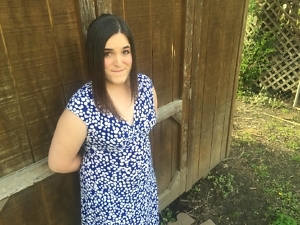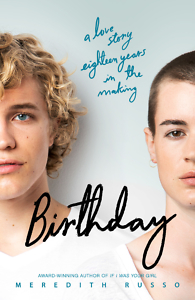Trapped in the Wrong Body
Meredith Russo’s new YA novel asks what you should do when everybody who “knows” you is wrong
In her second YA novel, Birthday, Chattanooga writer Meredith Russo chronicles the difficult, heartbreaking, and ultimately uplifting journey of a teenager’s quest for self-recognition and acceptance.

Best friends Morgan and Eric live in a hyper-masculine world in Thebes, Tennessee, a small town in economic decline. There are few women or girls in their immediate circle: Morgan is an only child whose father, a football coach and P.E. teacher, is widowed. Eric, a star football player, is the youngest of three brothers with an abusive father who dominates his wife. Both characters, of course, are boys.
Except they’re not—or, at least, only one of them is. The word “boy” doesn’t fit Morgan’s own self-perception, but she can’t tell anyone the truth—not her father, still lost in his grief; not her one female friend, Jasmine; and not even her best friend, Eric, who shares her birthday.
While both Morgan and Eric tell the story, Birthday belongs to Morgan. The novel opens on the friends’ thirteenth birthday, and the plot unfolds in installments over the course of five years, one on each birthday. Both characters give an account of what has happened in the previous year, creating two continuous narratives that allow Russo to examine the issues of love, bewilderment, denial, and acceptance from two points of view: the character who experiences the mismatch of body and identity, and the character who deeply loves her.
 At first, Morgan doesn’t have the tools to articulate the disturbing feelings she’s been having. But as puberty looms, she knows that her self-image and her actual body will keep diverging: “Every day I feel … more afraid I’ll look in the mirror and find myself twisting into a tall, hairy man who never gets to turn back.” If she can only tell her truth to Eric, she thinks, she might be able to find a way to stop the transformation from happening, or at least to understand it better and feel less tormented by it. But each time she pulls together the courage to confide in her best friend, she loses her nerve.
At first, Morgan doesn’t have the tools to articulate the disturbing feelings she’s been having. But as puberty looms, she knows that her self-image and her actual body will keep diverging: “Every day I feel … more afraid I’ll look in the mirror and find myself twisting into a tall, hairy man who never gets to turn back.” If she can only tell her truth to Eric, she thinks, she might be able to find a way to stop the transformation from happening, or at least to understand it better and feel less tormented by it. But each time she pulls together the courage to confide in her best friend, she loses her nerve.
By her fourteenth birthday, she has come to a deeper understanding of her feelings but also to more confusion and guilt: “A few things feel certain: I’m not gay. I’m not straight. I’m not made to connect to other human beings in that way, and I’m not sure I ever will. I’m just broken.”
As Morgan matures, she identifies and reluctantly acknowledges the situation, and she begins to explore her female self. An embarrassing attempt at using makeup, an inability to find anyone who can help her, a fear that she’s adding to her mourning father’s depression, and relentless bullying—both verbal and physical—convince her to try to change herself into what others perceive her to be. She briefly re-joins the football team, working out fiercely to create a more manly body, which of course doesn’t improve matters.
When the torment of keeping her secret becomes too much, Morgan starts drinking to dull the pain, and ultimately takes a dangerous step that could have disastrous consequences but for Eric and the bond they share.
The hatred directed at Morgan can be disturbing, especially if readers aren’t prepared for it, but it rings true and serves a vital function in the plot. Eric’s loyalty and support for Morgan, as well as her father’s determination to find out what’s wrong and to help her, all serve to prevent despair from taking over. Some readers might find the fairy-tale ending unrealistic, but for others it will be a satisfying closure to the arc that started on these friends’ thirteenth birthday. Morgan and Eric will have much to contend with in the future, but they will always have each other, one way or another.

Tracy Barrett is a writer who lives in Nashville. Her most recent book, Freefall Summer, was published in 2018 by Charlesbridge Teen.


